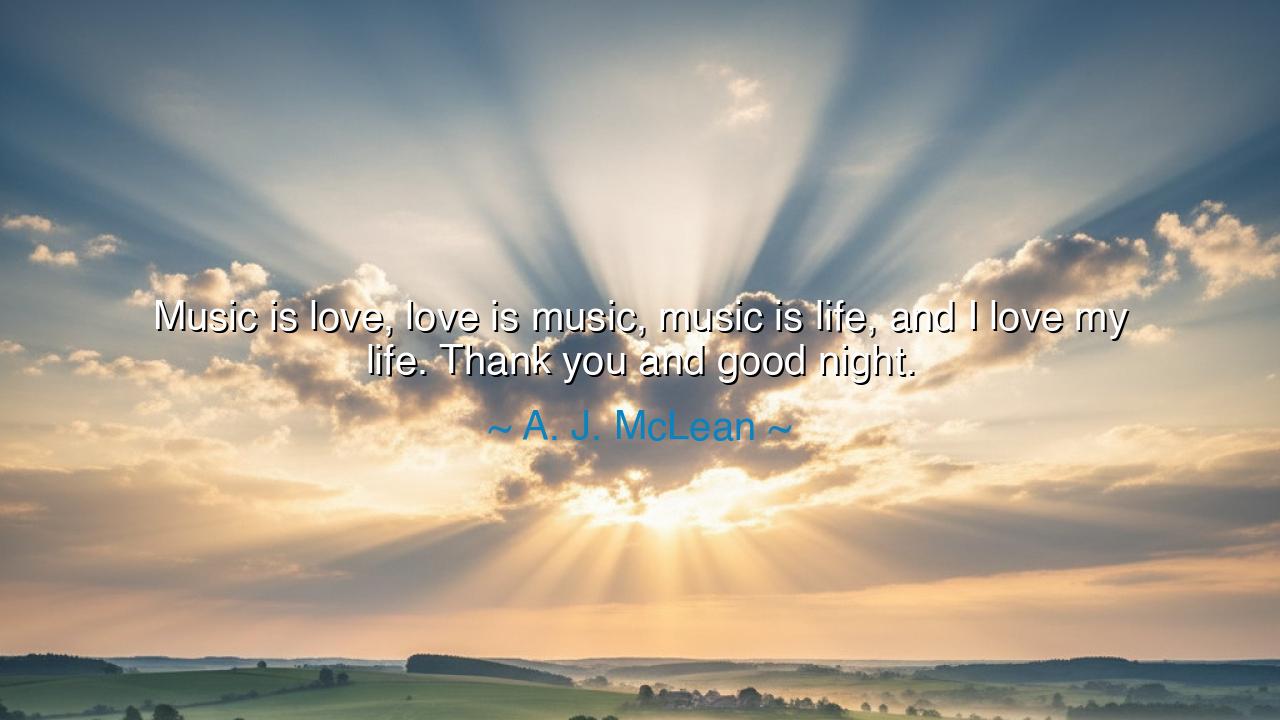
Music is love, love is music, music is life, and I love my life.
Music is love, love is music, music is life, and I love my life. Thank you and good night.






Hear now the words of A. J. McLean: “Music is love, love is music, music is life, and I love my life. Thank you and good night.” These words, though simple in form, are weighty with truth. They ring as the closing benediction of a bard, who has spent his soul in song and now offers wisdom distilled. They are no idle farewell, but a summoning of the eternal bond between art, love, and life itself. For what is music but the unseen thread that binds human hearts across time, across sorrow, across joy? And what is life without love, without song, without that sacred rhythm that carries us forward?
In this utterance we find a circle of meaning: music flows into love, love transforms again into music, and together they sustain the essence of life. It is a reminder that the melodies we carry are not separate from our being—they are the very breath of our existence. In the ancients’ time, this truth was already known. Pythagoras spoke of the “music of the spheres,” declaring that the stars themselves sang as they moved through the heavens, and that all life was patterned in harmony. To say that music is life is to proclaim that existence itself is a song composed by the divine.
Consider, too, the story of Orpheus, the legendary poet and musician of Greece. With the power of his lyre, he could charm beasts, trees, and even stones. His music was so filled with love that he dared descend into the underworld to retrieve his beloved Eurydice. Though he faltered at the last step, his tale reveals a truth that endures: where music dwells, love follows, and where love burns, life itself is given new force. Orpheus’s failure teaches us not despair, but awe—that song is a divine flame, capable of moving even gods.
A. J. McLean’s declaration comes from a modern stage, yet it is kindred to these ancient voices. In the roar of crowds, under the weight of fame and expectation, he pauses to confess that all he has sung, all he has endured, is born from love. His life has been shaped by the power of music, and he acknowledges this with gratitude: “I love my life.” There is humility here, but also triumph. It is the voice of one who recognizes that to live in harmony with song is to live fully.
The lesson is plain and profound: do not treat music merely as entertainment or background noise, but as a living force, as a sacred bridge between souls. For when you embrace music, you embrace love; and when you live in love, you live in fullness. The joy of life does not come from possessions or fleeting victories, but from harmony—harmony with yourself, with others, with the greater symphony of creation.
What then should you do? Make music part of your daily walk, whether through song, instrument, or the attentive ear that listens. Let it soften your anger, let it strengthen your courage, let it remind you of the beauty of existence. Share it with those you love, for in that sharing you give them more than sound—you give them your soul. And above all, remember gratitude. Like McLean, close your days with thanks: “I love my life.” For in gratitude lies the harmony that sustains all things.
Thus, future generations, carry this teaching: music is love, love is music, music is life. These are not separate truths, but one truth spoken three times, so you may not forget. When you feel lost, listen for the song within you; when you feel weary, let love tune your heart; when you rejoice, let your life be a chorus of thanksgiving. For the day will come when the lights dim, and your voice must give its final farewell. On that day, may you speak as McLean spoke: “Thank you, and good night.”






AAdministratorAdministrator
Welcome, honored guests. Please leave a comment, we will respond soon